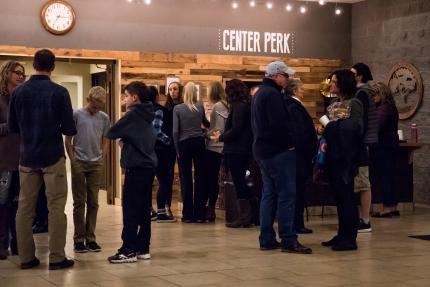COD Reviews 'Most Extensive Research Ever' on Church Planting

Recent research conducted on church plants, such as Connections Church (formerly Apex Church) in Littleton, Colo., will be significant for the health of the entire denomination.
Dale VandeGriend, Resonate Global Mission
At February’s Council of Delegates (COD) meetings in Grand Rapids, Mich., Resonate Global Mission presented results from the most extensive research ever conducted on church planting in the Christian Reformed Church in North America (CRCNA).
As part of an ongoing denominational conversation about church planting, this research will be significant not only for the CRCNA’s future work in church planting but also for the health of the denomination overall.
“CRC church plants are on the front lines of bringing and being the gospel of Jesus Christ in communities, and they are important for the health and growth of the denomination,” explained Resonate director Zachary King.
King noted, however, that church planting is one of the most difficult things people can undertake. Church planting requires a collective effort from church planters, their spouses, regional classes, established congregations, Resonate regional staff members, and other denominational ministry partners.
The research began in fall 2018. Resonate worked with the Calvin College Center for Social Research to survey 275 people who have been involved in planting CRCNA churches in the past 10 years.
“We knew we had to do a better job supporting church planters and church-plant spouses,” said Kevin Schutte, a CRC church planter who also works with Resonate and other denominational ministries to support mission-shaped congregations.
“As North American culture continues to change, we think it is important to understand our past and present church-planting practices—how effective they have been and how they have been received by different segments of the CRCNA. I’m excited about the level of participation. It tells me there is still a passion for church planting.”
The survey results were collated, and a summary report was provided to the COD for review and discussion.
Overall, respondents expressed enthusiasm and support for church planting—both as a way for the CRCNA to reach more people for Christ and as a way to keep the denomination healthy and growing.
Church planting “is a vital way to evangelize, and we need to develop new congregations,” said one participant.
“It’s vitally important to the life of the denomination,” said another. “Church plants lead by doing more cutting-edge things.”
The research also showed that church plants are not the only congregations that experience growth through these efforts. Fifty-seven percent of parent churches reported that the process of planting increased their own vitality as well.
But the survey results also highlight concerns about the CRCNA’s approach to church planting. Church planters expressed a disconnection from the denomination’s agencies and established congregations. They requested better support, more training, improved contextual knowledge for engaging communities, and a singular vision for CRCNA church planting that could better mobilize their efforts.
“Church planting requires a lot of pastoral caring and encouragement,” noted one participant. Church planters “want to feel that their work is a joint effort that other [church planters] are doing too. I cannot [overestimate] ‘fellowship’ and getting to know each other.”
Schutte said the survey responses give the CRCNA a better understanding of the current reality of church planters and a place from which new strategies can be developed. Because church planting is something that the CRCNA is also collaborating with the Reformed Church in America on, the results will also be shared with that denomination.
Resonate is now in the process of following up on the survey responses by organizing focus groups throughout Canada and the United States.
With feedback from the survey and the focus groups, Resonate will work with denominational ministries to draft recommendations for new church-planting strategies moving forward. These recommendations will be presented at the next COD meeting in May 2019.
Schutte notes that while Resonate plays a key role in CRCNA church planting, survey results show that church planting will require a full denominational effort.
“Every agency, every church, every classis needs to understand the importance and necessity of church planting. Church planting needs to be elevated within the denominational system to become a top priority,” he said.
“This evaluation is really a process in which we have to come together as CRC agencies, churches, and leaders,” added King. “There’s really no way for Resonate to carry the torch alone in church planting—but connection and collaboration are some of the strengths built into Resonate, so we feel God has been preparing us for this work.”


